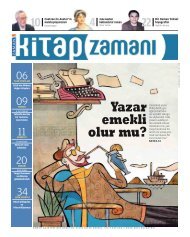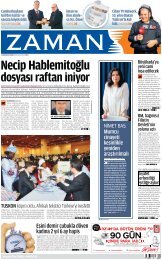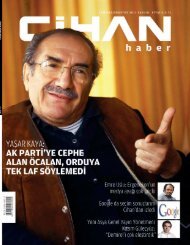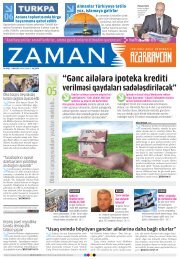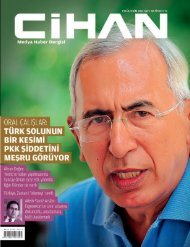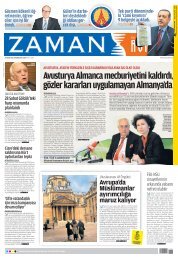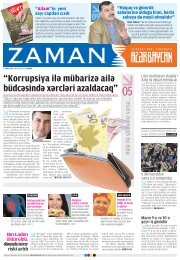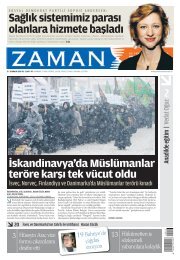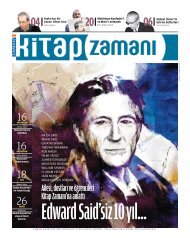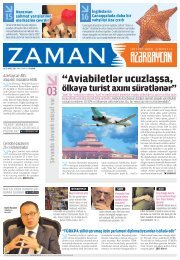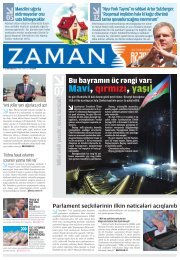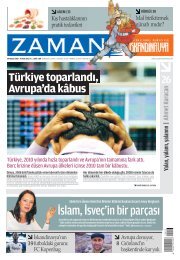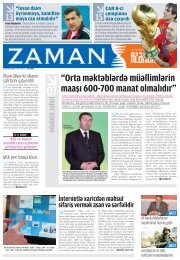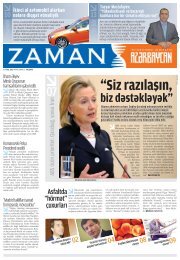Turkey warmly welcomes Russians - Today's Zaman
Turkey warmly welcomes Russians - Today's Zaman
Turkey warmly welcomes Russians - Today's Zaman
- No tags were found...
You also want an ePaper? Increase the reach of your titles
YUMPU automatically turns print PDFs into web optimized ePapers that Google loves.
R01-19-03-08.qxd 16.03.2008 21:32 Page 1A SPECIAL SUPPLEMENT BY FOR THE INT’L TRAVEL&TOURISM FAIR / MOSCOW 2008MARCH 19-22, 2008 WWW.TODAYSZAMAN.COM15About 1 million touristsexpected to visit ManavgatWaterfall in 200804Tourism operatorsseek longer visa termsfor Russian guests10Tarkan to putmark on Turkishyear in RussiaFHOTO TARIK ÖZTÜRKCulture and Tourism MinisterErtuðrul GünayTaking Turkishtourism sector tothe next levelERTUÐRUL GÜNAYCULTURE AND TOURISM MINISTER OF TURKEYThe tourism sector makes great contributionsto humanity in many areas, ranging fromeconomic development to dialogue, fromtechnological development to preservation ofenvironmental and historical legacies, frompromotion of a consensus culture to world peace.Today, the priorities and strategies in thetourism sector overlap with the requirements andpriorities of the globalizing world. Improvinginvestment and business volumes at the nationaland international level, producing income, creatingnew employment opportunities and enrichingsocial and cultural life, the tourism sector haswidened its scope from the traditional sea and sunmentality to alternative areas of tourism. TheTurkish tourism sector represents an importantsource of income for the country and has madesignificant strides in becoming competitive andsuccessful in the global tourism sector. CONTINUED ON PAGE 05WEF: Tourismpotential underminedby terrorism, sanitationA World Economic Forum (WEF) report statesthat <strong>Turkey</strong>'s problems with terrorism, sanitationand transport infrastructure limit its overall competitivenessin tourism, leaving <strong>Turkey</strong> in 54th place out of130 countries. The report, "Travel and TourismCompetitiveness 2007," also includes a travel andtourism competitiveness index which evaluates theperformance of the countries based on the measuresthat have been taken to improve the travel and tourismsectors. The countries that implemented the mosteffective measures, including environmental policies,to attract tourism investors and consumers wereranked at the top of the list. On the list Switzerland featuresin first place and <strong>Turkey</strong> comes in 54th, despite itsrecent popularity among tourists. The ranking particularlyconsidered regulations that facilitate tourism business,sustainable environmental policies, security andsafety, health and hygiene, attention paid to tourismand travel, transportation infrastructure, tourisminfrastructure, competition in price, human resources,and natural and cultural resources. CONTINUED ON PAGE 09A HEARTY WELCOME IS THE REASON WHY TURKEY REMAINS THE FAVORITE FOR RUSSIANS<strong>Turkey</strong> <strong>warmly</strong> <strong>welcomes</strong> <strong>Russians</strong>E. BARIÞ ALTINTAÞ, ÝSTANBULRussia is a cold country; this is why most<strong>Russians</strong> love the sun. Perhaps that is one ofthe main reasons why they are the secondlargest group of visitors from any country to <strong>Turkey</strong>,whose western and southern coasts offer greatbeaches and the warm touch of the summer sun aswell as a good standard of service for people who likethe eat-drink-sleep sort of vacation. However, withsome European resorts -- openly or covertly -- introducingquotas to limit the number of Russian visitors,being able to find a hearty welcome and the usualrespect hosts should reserve for their guests is also areason for most <strong>Russians</strong> to prefer <strong>Turkey</strong> as a greatplace to rest, many tourists and tour operators agree."In my opinion, <strong>Turkey</strong> is a fascinating place; Ihope I go there again. And using this occasion, I wantto give all Turks a hot hello! Kisses," reads a messageposted on the travel blog of mail.ru, the largest freemail service available to the Russian-speaking worldand indisputably the most popular Russian site on theWeb, with more than 30 million users three years ago.One message says Turkish men are too persistent but"they act wonderfully if you behave like a normal person,"snaps another. "What are you talking about!?It is the best country, and Turks adore <strong>Russians</strong>!"says yet another. A majority of travelers who havebeen to <strong>Turkey</strong> leave very positive messages and getvery defensive when replying to a negative message.Most users on the forum, like the averageRussian tourist, emphasize Turks' friendliness.The primary reason why <strong>Russians</strong> prefer <strong>Turkey</strong>,according to Vladimir Kaganer, the general director ofTez Tour -- one of Russia's largest travel agencies, flyingthousands of people to <strong>Turkey</strong> every year -- is thatthey know they will have a good vacation by the sea. Inan interview with weekly tourism journal Turinfo earlierthis month, Kaganer said: "Turkish hotels offer thatopportunity. Even now, a majority of Turkish hotels arebooked 90 to 100 percent by Russian customers. I thinkthe quality of the service they offer has improved." He<strong>Turkey</strong> becomes MITT’s fýrstever Partner Country ýn 2008ÝBRAHÝM TÜRKMEN, ÝSTANBUL<strong>Turkey</strong> will this year have the honor ofbeing the first ever Partner Country forRussia's premier travel and tourism tradeexhibition, the Moscow International Traveland Tourism Exhibition (MITT), which takesplace in Moscow's Expocentr on March 19-22.The deal between <strong>Turkey</strong>'s Ministry ofCulture and MITT organizers includes a premiersponsorship package and allows Turkishcompanies a considerable presence at the fair.<strong>Turkey</strong>, like many other destinations -- thosein the Mediterranean in particular -- is very interestedin increasing its number of visitorsfrom Russia. Demand for overseas tourism hasrisen in parallel to per capita wealth in Russia,and thanks to its geographical proximity,<strong>Turkey</strong> has already become a firm favorite withRussian tourists. With a stand area of 1,254square meters and over 500 Turkish companiesrepresented at the exhibition, <strong>Turkey</strong> is one ofthe largest exhibitors at MITT. It will occupy allof Hall 1 in Expocentr's brand new Pavilion 8.MITT marks its 15th edition this year, andhas seen increasing demand and prestige witheach of the previous 14. It is the largest tourismexhibition in the Russian Federation, theCommonwealth of Independent States (CIS) andCentral Asia and is consistently ranked by theUnited Nations World Tourism Organization(UNWTO) as one of the five most importanttravel trade exhibitions in the world. CONTINUED ON PAGE 11is quick to add that "the approach Turks have toward<strong>Russians</strong> is also very nice." However, he does not thinkthat affection only goes one way. "Turks also love<strong>Russians</strong> more than European tourists," Kaganer says."Our tourists are warmer, more communicativeand friendlier. They don't see Turks as second-classpeople." <strong>Russians</strong> have also changed, Kaganer asserted."Earlier, Turkish hotel managers could not understandwhy in 'all inclusive' hotels they filled their platesto the top and did not eat anything. 'If you take a glassof beer, you should drink it,' the managers said. Turkishmanagers were unnerved particularly by that habitand not by their being loud during dinner or on thebeach. Now those problems are gone. CONTINUED ON PAGE 02<strong>Russians</strong> makeAntalya theirvacation hotspotÞABAN GÜNDÜZ, ANTALYAAs their living standards increase inparallel to a surge in their oil and naturalgas revenues, <strong>Russians</strong> are changingtheir holiday habits. According to estimatesmore than 10 million <strong>Russians</strong> willgo on a vacation in 2008. Antalya is thetop destination for Russian touristsamong some 300 tourism destinationsaround the globe. Out of the 2.5 million<strong>Russians</strong> who visited <strong>Turkey</strong> last year, 2million spent their holidays in Antalya.This year a further increase is expected.Mircalol Husanov, the consul generalin Antalya for the Russian Federation,states <strong>Russians</strong> like the environment inAntalya and find it suitable for holidays.He notes that about 2 million Russiantourists visited Antalya last year. CONTINUED ON PAGE 03Germans' rush inearly reservationsrace may shutout <strong>Russians</strong>AHMET YEÞÝL, ANTALYAAlanya Tourism Enterprises Association(ALTÝD) Chairman Gülçin Güner hassaid there may be no vacancies available forRussian tourists, who usually make reservationsat the last minute, due to highinterest in early reservations. Güner said hebelieves 2008 will be a busy year in terms oftourism, saying that Germans in particularhave shown a keen interest in early reservations."Should the demand for early reservationsremain this high, then <strong>Russians</strong> mightfind it difficult to find accommodationbecause they usually make last-minute travelplans. We advise <strong>Russians</strong> to make earlyreservations," she added. CONTINUED ON PAGE 04
R02-19-03-08.qxd 16.03.2008 22:20 Page 102 TODAY’S TOURISMMARCH 19-22, 2008AGENDASunny <strong>Turkey</strong><strong>warmly</strong> <strong>welcomes</strong>Russýan tourýstsFHOTO ABDURRAHMAN BÜYÜKKESKÝNcontýnued from page 1People traveled around, now they make money." Hesays an open buffet is no longer something extraordinaryfor <strong>Russians</strong>. "We don't get any complaints from hoteliersthat Russian customers act worse than other tourists." AhmetBarut, chairman of the Turkish Hotels Federation (TÜROFED),agrees. "Well for one thing, we as a country don't have the luxuryto choose our customers. We consider ourselves lucky justbeing a neighbor to a country like Russia with such great touristpotential. Secondly, it is true that hoteliers had some complaintsin the initial years, but most of those stemmed fromtraveling abroad for the first time. As they traveled more, naturally,as their experience of traveling abroad expanded thebehavior people found less savory naturally normalized."Barut also says that <strong>Russians</strong> are mostly quite pleased withpeople's attitudes here and the service. "The highest number oftourists out of Russia visit <strong>Turkey</strong>," he says, saying this serves toshow that <strong>Russians</strong> are happy with the Turkish vacation. SururiÇorabatýr, head of The Mediterranean Tourism Hoteliers andOperators Union (AKTOB), says that in addition to <strong>Turkey</strong>'s climate,reasonable prices and the good quality of service, <strong>Turkey</strong>'shotels also offer physical proximity to Russia. Antalya's world-classfacilities in particular meet Russian expectations, Çorabatýr maintains.Tourist love in figures<strong>Turkey</strong>'s Ministry of Culture and Tourism is spending $10 millionthis year to promote <strong>Turkey</strong> in Russia. <strong>Russians</strong> love<strong>Turkey</strong>'s sun and seas, but there is still much to tell them, assome among them can only name two cities in <strong>Turkey</strong> (Antalyaand Ýstanbul). In 2007, <strong>Turkey</strong> hosted 2,465,000 Russiantourists, according to Tourism Minister Ertuðrul Günay, up by33 percent from 2006. Tour operators in Russia and <strong>Turkey</strong>expect that growth to continue this year. Russia sends the second-highestnumber of tourists to <strong>Turkey</strong> after Germany, whichsent 4 million people to the country last year. For Russia, <strong>Turkey</strong>is the top country residents choose for their summer vacation.According to data from Russian governmental statisticsagency Rosstat, <strong>Russians</strong> are traveling abroad with increasing frequency.In 2003, 5.7 million Russian citizens visited foreign countriesfor the sole purpose of travel or vacation, a figure that rose to6.6 million the next year, 6.8 the following year, 7.8 million in 2006and 9.36 million last year. <strong>Turkey</strong> remains one of the most populardestinations for <strong>Russians</strong> still. Last year, however, was significant,since the 30 percent increase in the number of Russiantourists in 2007 followed a 5 percent fall from 2005 according to2006 figures. Indeed, the increase is so conspicuous that lastmonth Turkish Airlines (THY) announced it would begin operatingdirect flights on March 31 between Rostov-on-Don, a city of 1million, to Antalya, a favorite of Russian tourists in <strong>Turkey</strong>. In fact,THY has been planning direct flights for a long time.<strong>Turkey</strong> and Russia need each other<strong>Turkey</strong> and Russia greatly need each other's help in thetourism sector, Europe <strong>Turkey</strong> Tourism Council (ETTC)President Hüseyin Baraner said to the press during a meetingof the Russian Turkish tour operators in Moscow in January.Baraner says that <strong>Turkey</strong> and Russia need to come togetherand set up a Russian-Turkish tourism committee that wouldimprove the sector for both countries. "We can find a place forourselves in the world market by jointly creating new brands."Günay, who was present at the same convention, highlightedthat it was possible for <strong>Turkey</strong> to host even moretourists. "A majority of <strong>Russians</strong> still don't have passports,"Günay said, underlining the country's 140 million population."The number of tourists coming to <strong>Turkey</strong> is bound toincrease as more people there get passports."
R03-19-03-08.qxd 16.03.2008 21:35 Page 1AGENDAMARCH 19-22, 2008TODAY’S TOURISM03<strong>Russians</strong> make Antalyatheir vacation hotspotAccording to estimates more than 10 million <strong>Russians</strong> will go on a vacation in 2008.Antalya is the top destination for Russian tourists, among some 300 tourism destinationsaround the globe. Out of the 2.5 million <strong>Russians</strong> who visited <strong>Turkey</strong> last year, 2 millionspent their holiday in Antalya. This year, a further increase is expectedMircalol Husanovcontýnued from page 1"This figure is a sign of the interest Russiantourists have in <strong>Turkey</strong> and particularly inAntalya," he says. "This year we will outnumber theGerman tourists, who are at the top of the list amongforeign tourists visiting <strong>Turkey</strong>. We can do this if therate of increase continues at this pace. We are pleasedwith so many <strong>Russians</strong> spending their holidays inAntalya. This shows that our countries and nationsare indeed very close to each other," he notes.Husanov details the features that draw <strong>Russians</strong>to Antalya -- its sea, mountains, lush greenery, perpetualsun and rich history. He also touches on thecultural similarities between the two countries."Turkish culture is not alien to the Russian people.They have considerable interest in Turkish culture.Also, the hospitality of the Turkish people and theirwarmth are among the factors that prompt <strong>Russians</strong>to come to <strong>Turkey</strong>," he says.The consul general notes that while <strong>Russians</strong>make great contributions to Turkish tourism, there arealso some things that prevent them from visiting. Hecites double booking as the most common problemRussian tourists encounter in <strong>Turkey</strong>. "According tostudies, a tourist who leaves a country satisfied withtheir vacation experience will bring three new touristsnext year. However, an unsatisfied tourist will result in11 people not choosing that country. Therefore, it is vitalto ensure tourist satisfaction. In this regard, thegreatest responsibility lies with Turkish tourism operators.The agents working in this sector should be verycareful. It is very important that emerging problemsare solved amicably. Otherwise, small problems maylead to bigger ones. In particular, this year is very important.Last year, some Russian tourists found thatthey had no place to stay because of a double reservation.This year, similar incidents may increase. No oneassumes responsibility for such problems. The hotelaccuses the agency, while the agency blames the hotel.But the tourist is disappointed because he was expectinga good holiday. There has not been much changein the capacity of hotels this year, but an increase intourist numbers is expected. This implies that reservationsshould be more carefully made," he says.Husanov also notes that Russian tourists have complainedabout a general decrease in the quality of serviceprovided by hotels. He makes suggestions on how toimprove tourism opportunities during the winter season."In winter, health tourism takes on importance.Unfortunately, the hotels here cannot make good use oftheir assets. However, they have the required infrastructure.For treatment, post-operative care and recuperation,hotels can offer holidays under a physician's supervision.Moreover, in terms of winter tourism,Davraz and Saklýkent may be utilized for skiing. Onthe same day, a tourist can swim in the pool at the hoteland go skiing. Business and convention tourism,too, should not be ignored. Antalya is an attractiveplace for conventions in the winter," he explains.He gives one further suggestion for Turkishtourism operators: "The big companies in Russia canbe contacted to make deals in which their employeeswould vacation in Antalya. For instance, Gazprom hasmore than 100,000 employees. If suitable promotionalcampaigns can be run, they may choose Antalya."March 19-22, 2008Owner on Behalf of Feza Gazetecilik A.ÞALÝ AKBULUTChief Executive OfficerEKREM DUMANLIEditor-in-ChiefBÜLENT KENEÞEditorChief Marketing OfficerDeputy Chief Marketing OfficerBrand Marketing DirectorAdvertisement Sector ManagersResponsible Manager andRepressentative of the OwnerÝBRAHÝM TÜRKMENYAKUP ÞÝMÞEKBEYTULLAH DEMÝRÝSKENDER YILMAZAHMET BOYACIEMEL DAVARCIHARUN TAZEGÜLLÜALÝ ODABAÞIPublic Relations Contact Information: 0212 454 84 54,Address: Today’s <strong>Zaman</strong>, 34194 Yenibosna, ÝSTANBUL. Phone:+90 212 454 1 444 Fax: 0212 454 14 97, Web Address: http://www.todayszaman.com,Printed at: Feza Gazetecilik A.Þ. Tesisleri. Advertisement Phone: +90 212 454 82 47,Fax: +90 212 454 86 33. <strong>Today's</strong> Tourism abides by the rules of press ethics.
R04-19-03-08.qxd 16.03.2008 21:38 Page 104 TODAY’S TOURISMMARCH 19-22, 2008AGENDATourýsm operators seeklonger výsa terms for Russýans‘The Foreign Ministry does not currently require a visa for Russian visitors for periodsup to two months. We will lobby the ministry to increase this no-visa durationto three or four months,’ says AKTOB Chairman Sururi ÇorabatýrTourism operators in Antalya, the primarydestination in <strong>Turkey</strong> for tourists from theRussian Federation, have asked theForeign Ministry to issue visas for longer periodsto facilitate a longer stay by tourists.The Mediterranean Tourism Hoteliers andOperators Union (AKTOB) has applied to the ForeignMinistry for a review of visa terms. Pointing out that avisa is not required for short stays in <strong>Turkey</strong> for citizensof the Russian Federation, AKTOB head SururiÇorabatýr said: “The Foreign Ministry does notAKTOB ChairmanSururi Çorabatýrcurrently require a visa for Russian visitors for periodsup to two months. We will lobby the ministry toincrease this no-visa duration to three or four months.”The Turkish tourism sector saw significant profitsin 2007 as tourist numbers increased, and as inprevious years, Antalya in particular was the leadingdestination for tourists. Russian tourists showedincreased interest in this city that was previouslyviewed as only a domestic holiday location. Inresponse to their interest, the tourism operators inthe city decided to lobby for a visa extension.As seen in the breakdown of nationalities oftourists arriving in Antalya last year, the <strong>Russians</strong>egment rose to 25 percent. This rate of increase, if itcontinues, will see Germans fall from the top of thelist, where they have placed since the 1980s. Antalyaalone hosted 1.8 million Russian tourists last year.Çorabatýr spoke to Today’s Tourism, statingthat Antalya’s balmy climate and the short distancebetween countries appeal to Russian tourists andthat competitive prices and high quality service areamong other reasons for their choice. He assertedthat the tourism facilities in Antalya were new andwere on par with world standards. “Antalya livesup to their expectations,” he said.“The number of Russian citizens with a passport isincreasing each day. Given the economic developmentin this country, it is obvious that more and more<strong>Russians</strong> will opt for Antalya for their vacations.Indeed, in the Russian Federation, the word holiday isnow associated with Antalya before <strong>Turkey</strong>,” he said.This can be substantiated by the figures, althoughfor now their interest is restricted to summer. In May,June, July and August, <strong>Russians</strong> prefer the 640kilometer coastal zone of Antalya, though the wintermonths see a drop in Russian visitors. After October,they tend to prefer Egypt, which they often cite aswarmer than Antalya. Antalya’s tourism operatorssay however that this perception is wrong, notingthat even in winter the difference in temperaturesbetween Egypt and Antalya is only three or fourdegrees. They argue that Antalya can be a majorholiday destination even in the off-season, a claimvalidated by meteorological figures. According toclimate records, more than 300 days a year are sunnyin Antalya, where the sun continues to warm thecrystal coast even in winter. Antalya Today’s TourismGermans’ rush in earlyreservations race mayshut out <strong>Russians</strong>contýnued from page 1In an exclusive interview withToday’s Tourism, Güner noted thatALTÝD does its best to participate inany and all domestic and foreigntourism fairs in order to promoteAlanya. These efforts are paying off asthe number of European visitors in2008 is expected to increase by 15percent over last year, according to her.Based on the turnout at fairs theyattended, Güner said that Germans,who show particular interest in theAlanya, Side, Lara and Belek regionsof Antalya, the British, the Belgiansand the French follow the Germans interms of interest in <strong>Turkey</strong>.Noting that they are “very contentwith the high demand,” Güner on theother hand underlined that this may bringalong with it a “double season” problemstemming from excessive demand.Güner also stressed that ALTÝDbegan work earlier this year onAlanya’s promotion for the 2008tourism year. She noted that as ALTÝD,they have attended fairs in countriessuch as the Netherlands, Norway,Austria, Finland, Slovakia, Denmark,Gülçin GünerLatvia and the Czech Republic so far.“We received very positivereactions during the fairs we attended,and we believe that attending fairspromotes interest in Alanya andincreases the number of reservationsthere,” she added. Güner alsocommented on the impact the TurkishArmed Forces’ (TSK) recent groundoperation into northern Iraq has hadon tourism. Saying that the operationdid not significantly affect tourism, shesaid the fact that the operation endedclose to the start of the tourism seasonwas the most important reason for this.Thermal Resort Oruçoðluvoted best spa hotelThermal Resort Oruçoðlu was awarded theThermal and Medical Spa of the Year prize inthe 2007 Spa Achievement Awards during <strong>Turkey</strong>’s1st National Spa and Wellness Congress,sponsored by the Culture and Tourism Ministry.The hotel, which had been previously selected bySabah and Hürriyet dailies as the best thermal and spahotel, operates within the thermal tourism categoryand is the first five-star thermal hotel in <strong>Turkey</strong>.Working on a half-board system, the hotel has 300rooms and 800 beds. The hotel was the first tointroduce the spa concept to <strong>Turkey</strong> 15 years ago,and its experience has been crowned with this award.The hotel’s Spa and Wellness Center offershealth, youth and beauty services includingoxygenated and normal dermal care, mud bath,aroma therapy, a “Cleopatra” milk bath, face lift care,masks, hair care, total or local cellulite massages,therapeutic massage, underwater massage, stonetherapy, fasting cures, solarium, Turkish bath, vaporbath, private family baths with whirlpool bath andsauna as well as a well-equipped physiotherapy andrehabilitation center that offers complete services undersupervision of physicians and physiotherapy experts.This center also contains a bioresonance antismokingtherapy unit that helps smokers quit. Thistherapy unit, a first for Afyon, offers successfulresults for smokers really determined to break thehabit. In addition, the laboratory in the spa centeroffers blood analysis to determine cholesterol,triglyceride, etc., levels. In the Spa and WellnessCenter, mineral bone density can be measured andearly diagnosis of osteoporosis can be made.Furthermore, body analysis can be performed andmuscle fat ratios can be calculated.The hotel has made a physiotherapy deal withKocatepe University in Afyon and under thisagreement costs for physiotherapy and rehabilitationcan be refunded under the insurance coverage ofSocial Insurance for the Self-Employed (BAÐ-KUR), the Social Security Authority (SSK), and thePension Fund (Emekli Sandýðý).The hotel has recently made a similar deal withAGIS, a major Dutch insurance company. Thus,those under AGIS insurance coverage will be able toget refunds for their accommodation and resortservices if their treatment is recommended by arheumatism expert. Afyonkarahisar Today’s Tourism
R05-19-03-08.qxd 16.03.2008 21:40 Page 1ESSAYMARCH 19-22, 2008TODAY’S TOURISM05Taking Turkish tourism to the next levelcontýnued from page 1Günay: In addition to traditional sun, sea andsand tourism, we are attempting to put ourhistorical and cultural assets to use in tourismand increase product diversity by investing incultural sites and thermal spring areasWith its ideal location where the Asian andEuropean continents meet, its historical,cultural and natural assets and rich product range,<strong>Turkey</strong> has many competitive advantages in worldtourism. These advantages give <strong>Turkey</strong> new opportunitiesfor undertaking new and different tourismactivities. In this regard, winter, health, faith andbusiness tourism and similar areas represent themain competitive edge that <strong>Turkey</strong> enjoys.Turkish tourism has progressed from earning$7.6 billion from 10.4 million tourisms in 2000 to$16.8 billion from 19.8 million tourists in 2006. Lastyear, too, saw many positive developments in thetourism sector as about 23.3 million tourists visitedthe country. These figures put <strong>Turkey</strong> among the top10 destination countries in the world.With a rich cultural legacy, unique natural settings,tourism diversity, quality tourism facilities andhospitable residents, <strong>Turkey</strong> is capable of offering afull range of holiday experiences to tourists.The accommodation facilities in our countryare relatively new and comfortable compared toEurope’s well-known destinations, such asSpain or Italy, and this is a great advantage forour country’s tourism sector.Antalya, Ýstanbul and other well-known citiesare among the most preferred destinations.Our ministry aims at ensuring sustainablegrowth in the tourism sector, developing tourismpotential in the inner regions of the country andusing tourism as a strong tool in local and regionaldevelopment. It is our target to make <strong>Turkey</strong>among the top five destinations in the world by2023 by creating new investment areas, increasingproduct diversity and establishing high standards.The figures from the year 2007 show that there is agood possibility or our achieving this goal.In addition to traditional sun, sea and sandtourism, we are attempting to put our historical andcultural assets to use in tourism and increase productdiversity by investing in cultural sites and thermalspring areas. We also want to use product-orientedpromotion by developing different advertisementand promotional campaigns designed specificallyfor different markets in our target countries.<strong>Turkey</strong>’s primary promotional strategy canbe described as destination-oriented promotionand marketing activities, in addition to promotionthat aims to create brands at national, regionaland local levels. Under its general promotionstrategy, our ministry is conducting destination-orientedpromotional campaigns that highlightoverall quality, emphasizing tourism productswhich are designed for target groups, makinguse of famous faces and supporting all of thisthrough public relations efforts.Our primary aims include promoting ourunique Mediterranean country, our quality tourismfacilities and the hospitality of our nation, in additionto our easily accessible location and rich culturalheritage. We want to develop <strong>Turkey</strong>’s imageas a clean, healthy and secure destination.In line with these targets, we will preparepromotional videos to highlight the eastern andsoutheastern regions, Antalya, the Aegean region,Cappadocia, spa and thermal tourism locationsand will ensure worldwide distributionof these videos for 12 months.With the www.goturkey.com project, weare planning to make use of novel technologicaldevelopments in our promotion activities. Thiseasily accessible Web site, which is offered inseveral languages, provides images and videosabout culture and art events, tourism opportunities,accommodation possibilities and otherinteresting information. It will help prospectivetourists to plan their holidays online so eachone can have a vacation fitted to their needs.We will also offer high-profile products focusingon conventions, golf, faith tourism, thermaltourism, health, winter sports, city and culture,yachting and other areas.Ýstanbul has an important project for 2010 as ithas been designated a European Capital of Culture.We will continue to lend support to this project.The making of Ýstanbul a European Capital ofCulture in 2010 is becoming more and moremeaningful given the development the region andour country is going through.<strong>Turkey</strong> will be the guest country at theFrankfurt Book Fair, the biggest of its kind, andthis will help us to promote culture, art and literatureas well as tourism for our country. It will alsohave important consequences with respect to furtherintegration with Europe.As part of its promotional work, our ministry attended139 fairs last year and is scheduled to attend142 in 2008. We prepared year-long promotionalcampaigns and unveiled them at the start of this year.We are working to highlight <strong>Turkey</strong>’swealth of nature, culture and history as well asthe hospitality of our people. We will extendour communication network by using the latesttechnology to improve the competitiveness ofour tourism sector in the world.We are preparing to implement regionaland sector-based incentives for developing newtourism products. In 2008, the Culture andTourism Ministry will develop and implementprojects for seven tourism corridors, four ecologicaltourism areas, 19 “brand” cities and 10tourism cities as part of the action plan.I believe that our country will take itstourism sector to the next level.PHOTO MEHMET ALÝ POYRAZ
R06-19-03-08.qxd 16.03.2008 22:25 Page 106 TODAY’S TOURISMMARCH 19-22, 2008FOCUSEXPO 2015 would save Izmýr 25 yearsWill EXPO 2015 be in Ýzmir or Milan?Ýzmir seems to be more advantageousthan its rival, owing to its largerinvestment potential, and would attain its goalsset for 2040 25 years ahead of plan, in 2015, if itwins the bid. In such a case, the pearl of theAegean would attract a great number ofdomestic and foreign investors. Sixteen millionvisitors are expected to attend the EXPO 2015Ýzmir universal exhibition, for which thegovernment has allotted $1.3 billion.Ýzmir is entering the last stage of the race withMilan to host the EXPO event, also known as theworld’s history, culture and education Olympics. Ifit becomes the winner in the voting, to be held inthe Bureau of International Exhibitions (BIE)general meeting in Paris, Ýzmir will be able tomake 32 years of investments in seven years. Inother words, it will attain its 2040 goals 25 yearsahead of the expected time. For the city, EXPO willserve as a facilitator to achieve its goal to become acenter for fairs and conventions. Ýzmir will becomea renowned city in the field of health, owing to itsproposed theme for the EXPO: “New Ways for aBetter World and Health for Everyone.”The Ýzmir Metropolitan Municipality hasreported that the city has undertaken lobbyingactivities abroad to promote Ýzmir’s candidacy forEXPO 2015; municipality authorities expectremarkable growth in the city’s economy as a returnon the 15 million euro budget. Estimates underlinethat the project will increase the business capacity ofthe city; current predictions run from $15-25 billion.The expected number of visitors to the organizationfor a six-month period is 16-20 million. This impliesthat 40 million visits will be made during the event.The average daily number of visitors to the EXPOsite is expected to be around 300-360,000.The exhibition site in Ýnciraltý will include anamphitheater, an EXPO lake and tower, anoutdoor theater hall, 94 pavilions, 103restaurants, 30 stores and public areas and sitesreserved for general services and visitors.Seventy-six of the pavilions will be reserved forparticipant countries. The site will be arranged tohost 35,000 shows with 75,000 actors, actressesand artists. The number of people to be employedon-site for the six-month period is 1,200.The circulation in the number of visitorswill positively affect transportation,infrastructure and tourism activities in the city.Experts estimate that the city’s thermaltourism potential will attract a large number ofvisitors to Çeþme, Karaburun and Seferihisar.If it wins the bid for the EXPO 2015 event, Ýzmir, the pearl of the Aegean, is expected to attract at least 16 million domestic and foreign investors in one year.Amid the preparations for EXPO in the city, theMetropolitan Municipality is sponsoring a numberof projects; the municipality has made a totalinvestment of $1 billion in the last three years,paying careful attention to prestigious projects thatwill create synergy owing to EXPO. To this end, cityauthorities reserved a large area called “New Ýzmir”for skyscrapers, residences and business centers.With the adoption of new development plans thatwill dramatically change the outlook of the city bythe Municipal Assembly, the project will betransformed into the Manhattan of Ýzmir.On the project, Ýzmir Mayor Aziz Kocaoðlusays: “The tourism and service sectors areknown for their contribution to the generation ofemployment. This project will attract great sumsof investments to the city and resolve theunemployment problem. It will meet the city’sneed for skyscrapers. At least $10 billion ininvestments will be made. There will be nounemployment problem in Ýzmir. In the earlystages, about a dozen land owners showedinterest in making investments. There are a lot ofoptions and alternatives for this project. Thereare many who are interested in building hotels,business centers or malls. Our goal in the projectis to prepare a portfolio of investments forinvestors. Let us assume that an investor comesfrom China or the US to Ýzmir. He seeks to builda hotel, but there is no previously reserved areafor this purpose; he seeks to build a hospital butfinds no appropriate place to erect it. The samealso applies to industrial zones, fair area andconvention centers. There is no infrastructure orfoundation for this. We are trying to remove thisdeficit. We have determined the future of the cityvia the development plans. Investors will be ableto make sound decisions when they arrive in thecity, owing to the new development plan.”The EXPO 2015 Ýzmir Secretariat says thatthe total budget allocated to the organization is1.3 billion euros, whereas the total amount ofinvestments to be made in relation to EXPO willbe 461.1 million euros. Of the total figure, 75.6million euros will be reserved for investmentsrelated to urbanization and infrastructuralservices. A total of 14,000 people will work in thefair zone. Some of the infrastructure investmentsin relation to the EXPO event in Ýzmir in thefollowing seven years include a fast train projectthat will reduce the travel time between Ýzmirand Ankara to three hours, a new ferry dock inÝnciraltý, additional highways and the opening ofÇiðli airport to international arrivals.Reports indicate that a number of investorsare interested in projects and properties owned byÝþbank, Kula Mensucat, Petrol Ofisi, Turyað,Piyale and Tariþ to invest in. The first internationalgroup to announce its decision to invest in theregion was renowned British investment groupComberceli. The British company has beendoing preliminary work related to theconstruction of residences and shopping centers.PHOTOS TODAY’S ZAMANWhat is EXPO?EXPO events, which may be basicallydescribed as a cultural, historical andeducational Olympics of the world, call oncountries to share their visions andexperiences to make the world a betterplace. The goal of the EXPOs is not topromote the marketing of particularproducts of the countries but to encouragethem to present their cultural, historicaland national characteristics. This aims topromote expression of new ideas anddevelopment for a better world. The EXPOs,which have been held for 150 years,receive tens of millions of people in everyevent. The EXPO Universal Exhibition,which is held in a larger area than that ofthe Olympics and Soccer World Cups andlasts longer than these events, has beenheld in 63 different countries so far,attracting 800 million visitors.Delegates from 140countries will hold electionEXPO is the abbreviated form of “Exposition.”EXPOs that focus on international exhibitionsand universal exhibitions are called worldfairs. There are two other organizations: smalland large EXPOs. Ýzmir’s candidacy is for thegrand EXPO, held every five years. The ParisbasedBIE includes 140 member countries.The delegates from these countries vote topick a city to become an EXPO center. Ýzmirwill have to finish the race ahead of its rivalMilan in the voting session, scheduled to takeplace on March 31. That 22 million peoplevisited the EXPO event held in Aichi, Japan,and 70 million visitors are expected in theupcoming 2010 Shanghai EXPO gives a clueabout the magnitude and prominence of theevent. Experts note that <strong>Turkey</strong> will be ableto attract a greater number of visitors owingto its unique geography. The theme thatShanghai picked is “a better city, a betterlife.” The theme that Ýzmir has picked is acontinuation of that concept.Ýzmir’s competitor, Milan, held theGrand EXPO in 1906. Milan is expecting 25million visitors for EXPO 2015. The numberof visitors that Ýzmir plans to attract is farlarger than Milan’s estimates. In relianceon its unique geographical advantages,Ýzmir seeks to host 50 million visitors.Belek: Europe’sbest golf destinationNURULLAH KAYA ANTALYAA district in <strong>Turkey</strong> has beenchosen as the best golf destinationin Europe by the InternationalAssociation of Golf Tour Operators(IAGTO), putting <strong>Turkey</strong> ahead ofSpain, Scotland and England in therace to take a greater share from thebillion dollar golf tourism market.The specific location of Europe’sbest golf destination, the Belek district ofMediterranean resortcity Antalya, held acelebration ceremonyat the Cornelia GolfClub in Belek on Feb.25. Ministry ofCulture and TourismUndersecretary ÝsmetYýlmaz, AntalyaGovernor AlaaddinYüksel, IAGTO President PeterWalton, Turkish Golf FederationPresident Ahmet Aðaoðlu and CorneliaGolf Club Director General Ali Þahinwere present at the ceremony.Yýlmaz emphasized that theaward given to <strong>Turkey</strong> was a veryimportant development for Turkishtourism. “<strong>Turkey</strong>’s tomorrow will bebrighter than its today. The stepsthat are being taken are properones, nobody should doubt this,”he noted. Aðaoðlu said the share ofgolf tourism in Turkish tourismrevenues next year will be around$250 million, recalling that touristswho came to enjoy <strong>Turkey</strong>’s golfresorts spent at least seven or eighttimes as much as other tourists whosimply come for sea and sand.Belek’s natural beauty and hotelsplayed a big role in its selection asthe best golf resort of Europe,IAGTO President Walton noted.“About 50 million people play golfacross the world. European golfplayers travel to different countriesto play. A $3 billion euro market is atstake here. The countries better atinvesting and advertising have abigger slice of thiscake,” he said.Yüksel was quickto dismiss claims ofexcessive trees fellingin the creation of thegolf courses. “I havenever been interestedin the number of thetrees that have beencut down. That’s the responsibility ofthe Environment and ForestryMinistry. I’m more interested inplanting,” Yüksel said, adding thatmillions of trees had been planted inAntalya over the last five years. Henoted that cutting down old trees andplanting new ones is an important partof forestry management. “According tothe information provided to us, thenumber of the trees that have been cutdown is around 115,000. However, thenumber of planted ones is muchhigher than that,” he added.The 2008 Best Golf DestinationAward, which was presented to Þahinin December 2007 at a ceremonyheld in Mexico, was given to Yýlmaz.
R07-19-03-08.qxd 16.03.2008 22:21 Page 1HOTELSMARCH 19-22, 2008TODAY’S TOURISM 07‘Let’s makeAntalya thenew Cannes’With more <strong>Russians</strong> seeking to spendtheir annual holidays abroad as theirincome levels increase due to growingoil and natural gas revenue, Turkish tourismoperators are eager to get a bigger slice of theRussian tourism pie and predict a substantialjump in the number of Russian guests this year.Talha Görgülü, chairman of the board of theKayý Group, which brought 150,000 tourists fromRussia last year, said it was necessary to developmore appealing strategies to reach <strong>Russians</strong> fromhigher income brackets. "Spending one's summerholiday in Antalya has almost become a matter ofprestige in Russia. We need to put this to gooduse," he said. Speaking to <strong>Today's</strong> Tourism,Görgülü noted that there should be exclusive districtsand facilities for Russian tourists. "Let's designthe streets and roads of these districts in a waythat would appeal to them more. Let's bring in famousluxury brands. And we should correct theimage of a 'cheap country,' so as to draw <strong>Russians</strong>to Antalya in the winter, too, instead of Cannes,Egypt and Dubai. Then we can have a greatershare from the Russian market," he said.Görgülü stressed that Russia had greatimportance for Turkish tourism. "Because ofour currently lacking publicity, many<strong>Russians</strong> see <strong>Turkey</strong> as a destination to bevisited only during the summer. The situationwith European tourists is no different.We carry out all our publicity work with amindset oriented toward drawing them to<strong>Turkey</strong> only for the summer, which leaves uswith almost empty facilities during the winter.We have been unable to spread thetourism season year round. What we shoulddo now is spread it over at least 10 monthsat this stage. <strong>Turkey</strong> should be marketed likeDubai and Egypt. We should be able tospread the word that Antalya has warmweather in the winter and that <strong>Turkey</strong>'s wintertourism facilities are not limited to theone on the Palandöken Mountain," he said.According to Görgülü, who said it was amust to profit more from the area's new tourismfacilities, worth $30 billion, <strong>Russians</strong> and Turkshave very similar holiday habits -- such as decidingon where to go at the last moment. Butthis is totally different in Europe. Europeansmake their decisions a year in advance, whichgives hotels the possibility of taking bolder stepsin advance and making more detailed plans.The experienced tourism mogul attributes thegreat tourist influx from Russia to these reasons:"First and foremost is that Antalya has a hotclimate. Apart from this, <strong>Russians</strong> are very similarto Turks in terms of temperament. They go toEuropean countries only for the sake of visitingthem, but come to <strong>Turkey</strong> to make themselves athome. While feeling like strangers in Europe,they are comfortable here as our cultures are verysimilar. Although <strong>Russians</strong> seem to be cold peopleat first glance, they are actually very warm --even similar to the Anatolian people. Turks treat<strong>Russians</strong> better than they treat Europeans. Also,Russia is closer to <strong>Turkey</strong> than Europe. Theyhave no visa problem, either. Moreover, Turkishcuisine is more appealing to them."Görgülü reiterated that the Russian share inTurkish tourism was growing by the day, adding:"Previously, <strong>Russians</strong> had difficulty obtaining apassport and sometimes had to wait up to sixmonths. Now, they don't suffer such difficulties,and most problems, even visa ones, have beenovercome. Their interest in spending holidaysabroad is growing with their rising incomes.That's why they have gravitated toward <strong>Turkey</strong>."Görgülü also spoke about the Kayý Group's operationsin the Russian market. They entered theRussian market in 2004, he said, adding: "On acertain level <strong>Russians</strong> have been distancingthemselves from the Germans since World WarII. That's why we were advised not to enter themarket under the German Travel International[GTI] brand; hence, we opted to use anothername to enter the Russian market, and despiteour initial concerns. <strong>Russians</strong> adopted this brandin a very short time. They even said, 'We receivedso many complaints from our citizens who preferother brands [than GTI].' We were celebratedand appreciated by Russian authorities."Görgülü attributes the great Russian interestin his company to their quality service."When entering the Russian market, our rivalssaid that we would drop our prices dramatically.But we did not change our prices,and we were greeted very positively in Russia.We have won the trust of <strong>Russians</strong>. <strong>Russians</strong>,who value power so much and who saw thatthe Kayý Group was a very powerful Turkishcompany with its hotels, operators and travelagencies. That's how we were adopted in avery short time," he said. The Kayý Groupbrought 150,000 <strong>Russians</strong> to <strong>Turkey</strong> last year,and its target this year is to surpass the200,000 number. Antalya <strong>Today's</strong> TourismEla Quality puts customer satisfaction at centerThe Ela Quality Resort Hotel, whichopened for business last year in theTurkish tourism center of Belek, is offto a remarkable start with its customer satisfactionalready at 95 percent -- no surprisethen that CEO Vadi Karatopraklý is hopefulabout the future.In an interview with <strong>Today's</strong> Tourism,Karatopraklý says his hotel has achieved thecurrent level of success by distinguishing itselfas different, something he defines as the necessaryingredient for success in the tourism industry.<strong>Turkey</strong> is superior not only in terms offacilities but also in terms of qualified personnel,he adds, even in comparison to nationslike Spain, which attract 60 million tourists ayear. He underscores the need for <strong>Turkey</strong> toexpand to year-round tourism options, ratherthan just the summer, to increase and perpetuatethis level of success.Tourism in <strong>Turkey</strong> got off to a great start in2008, Karatopraklý notes, with early reservationsfor summer hotel spaces reaching a new recordby February. He predicts that the number ofRussian tourists brought to Belek by tourism operatorsthis year may double 2007's figure of600,000. Karatopraklý, analyzing the tourismsector in general in <strong>Turkey</strong>, asserts that his hotel'ssuccess is rooted in the belief that detailsmake the difference, pointing to touches like thespecial training received by the hotel's childcarestaff. The hotel, which combines Ottoman andmodern architectural styles, has a unique approachto quality and service -- something supportedfully by human resources at the hotel, hestresses. One example of this is "Academy Q,"created by the hotel for training their personnel,a project which has cost $500,000 thus far.Offering everything from duplex suites toking villas for guests, the Ela Quality ResortHotel has 550 rooms and a 1,400-bed capacity,and prides itself on making no price distinctionbetween local and foreign guests.Another important area of service offered by thehotel are the activities and services provided foryounger guests. "With our Everland Q services weoffer very special services to kids from 1 to 17. Forexample, we even have child psychologists andnurses trained to take care of children up to 3 yearsold in special rooms designated for this care. Whilewe attend to everything from meals to naps, theirmothers and fathers can go swimming in the sea ortake advantage of our spa without having to worry,"he explains. Karatopraklý notes that up to 50 percentof their guests are from Russia, 30 percent are fromvarious European countries and the rest are Turkish.Unparalleled quality and luxury"Though we hadn't even been established ayear, in 2007 we saw [an average] 80 percentcapacity in terms of room bookings, andhosted 17,000 guests. In 2008 we will raisethe number of guests served to 30,000. Wealso aim to raise the 95 percent customersatisfaction rating of last year up higher still,and along with it we target increasing our$22 million turnover of last year to $40 millionthis year. With our remarkable attentionto detail, our high quality and services, weare one of <strong>Turkey</strong>'s most luxurious hotels.Our prices start at $215 a night, though theygo as high as $7,500 for our king villas. Evenour spa services are different from other hotelsthat use Far Eastern names, as we insteadborrow from our own Turkish hamamculture, something we call the 'Lale' or'Tulip' spa concept."Positive outlook for the sectorKaratopraklý notes that despite the recent military operationinto northern Iraq, tourism numbers have notbeen negatively affected in <strong>Turkey</strong>, and that cancellationshave remained at only 1-2 percent or so. He says:"The <strong>Russians</strong> have now even started to make theirreservations for the summer in February, out of fearthat 'there will be no spaces left.' This area of the sectoris receiving lots of interest, and so far 2008 is going verywell. While we have mostly hosted German tourists inprevious years, this trend looks set to change, withmore and more Russian tourists coming in."In comparison to European countries, <strong>Turkey</strong> actuallyhas superior facilities and more qualified personnel,he adds, and as such it should be hostingmore and more tourists. He concludes: "As a sector,we need to ensure that tourism is something we offer12 months of the year. We need to do this, and in orderto do so, we need to define what it is that distinguishesus, and focus on these differences." He notesthat this is precisely what the Ela Quality ResortHotel has done in Belek. Ýstanbul <strong>Today's</strong> Tourism
R08-19-03-08.qxd 16.03.2008 21:43 Page 108 TODAY’S TOURISMMARCH 19-22, 2008HOTELSÞah Inn Paradýse pledges to offerbest of Turkýsh hospýtalýtyThe chairman of Kamer Holding,owner of the Þah Inn Paradise Hotel,has said that the hotel's most importantvision and mission are to offer its gueststhe best example of Turkish hospitality."We are trying to offer an enjoyable andprivileged holiday to our guests at our hotel withour experienced staff to make them feel andunderstand Turkish culture and hospitality atthe highest level possible," Chairman ÖzerSevencan stated. Speaking to <strong>Today's</strong> Tourismabout the Þah Inn Paradise Hotel and the servicesit provides, Sevencan explained that everydetail for guests' comfort is considered at<strong>Turkey</strong>'s only first-class holiday village.Located 90 kilometers from Antalya's citycenter and 105 kilometers from Antalya Airport,the Þah Inn Paradise provides services for itsfemale and male customers separately, thusmeeting the expectations of both. Located over anarea of 167,000 square meters, the hotel has a400-meter-long beach and both salt and freshwaterpools. The hotel also boasts an aqua-park,children's pool and a mother-child pool as well asa fitness center, massage parlor, beauty center,sauna and Turkish hamam. There is also a Jacuzzi,special secluded terrace for sunbathing, pool bar,snack bar and special game salon, all dedicatedsolely to female guests. There is also a special pooland children's club so mothers can truly relax.Meanwhile male customers can enjoytheir time in four different pools. There are40,000 square meters of green area on thehotel grounds, while the hotel itself has a1,400-bed capacity. For meetings there is a1,022-person capacity hall as well as a1,500-person capacity restaurant.The Þah Inn Paradise also provides specialservices to its customers on the occasionof religious festivals.There are four royal suites, five specialrooms for the handicapped and 100 familyand 295 standard rooms at the Þah InnParadise, all of which have balconies, minibars,telephones, wireless Internet connection,TV, information channels, air conditioners,en suite bathroom and hair driers.The Þah Inn Paradise provides services forthose who care about their health and beautywith its Turkish hamam, wellness and spacenter, fitness center, water activities, volleyballand basketball pitches, beach volleyballand various water sports on offer. The experiencedchefs of the hotel's kitchen prepareunique dishes with great care.Reservation offices located in Ýstanbul andAnkara and Suay Tour in Europe provide informationabout the hotel for customers. Sevencan,noting that the hotel management was planningto increase the number of reservation officesacross <strong>Turkey</strong>, added: "We are aware of the confidencepeople feel about the Þah Inn brand. Weinvite all holiday-lovers to our hotel and wouldlike to mention that we would be honored towelcome them here." Antalya <strong>Today's</strong> TourismIC HotelsResidence: theaddress for luxurytourism in AntalyaIC Hotels offers its distinctive FarEastern architecture, specially designedlandscape and exclusive services to guests,all in a boutique hotel category.Located in Antalya's Kundu-Aksuregion, IC Hotels Residence is only 15kilometers from Antalya Airport and 25kilometers from the city center. It offersguests luxury and comfort in a unique anddistinctive setting. With 44 luxury villaslocated on 70 hectares of green, lushlandscaping, IC Hotels Residencepromises its guests not only extremepleasure but ample romanticism.There is the exclusive Presidential Villa,set on 1,000 square meters of land andincluding four bedrooms, a fitness salon,Turkish hamam, sauna, dining room,kitchen and a 105-square-meter swimmingpool. The IC Hotels Residence also featuresfour villas with interior design by FendiCasa. Others include the Bali Deluxe, Bali,Gol Deluxe, and Gol Villas, all marked bytheir extreme luxury and attention to detail.Guests at IC Hotels Residence aretreated to some of the most deliciousworld cuisine at the Spybag a la carterestaurant on the hotel grounds. What'smore, guests at the IC Hotels Residencecan also facilities at the neighboring ICHotels Green Palace free of charge.Another site offering guests unlimitedrelaxation and serenity is the Lilium SpaCenter, the concept of which was created byBritish company HOK. There are also SpaSuites situated right on the shores of adelightful lake. All of the furniture used inthis special spa setting -- which offersguests a variety of massage and therapychoices -- was chosen by the luxury interiordesign firm Fendi Casa. Antalya <strong>Today's</strong> Tourism
R09-19-03-08.qxd 16.03.2008 21:42 Page 1AGENDAMARCH 19-22, 2008TODAY’S TOURISM09No reason to fear fast growth in tourism, says officialFew can deny that the Turkish tourism industryhas been thriving since 2000, and the resultingnumber of investments has seen a significant risein accommodations to house the growing number of foreignvisitors. However, this unprecedented growth isnonetheless being interpreted by some as a negative situationsince the growing number of investments has broughtalong greater competition, which naturally results in drasticdiscounts in prices -- and some say a drop in quality."I believe that fearing the fast growth of the sector ismeaningless," President of the Association of the AnatolianTourism Enterprises (ATÝD) Seçim Aydýn said. Assertingthat the growth in the sector was natural and in line withthe rules of supply and demand, he said: "However, whatwe should pay attention to at this point is that the competitionin quality is becoming more important than thecompetition over the lowest prices. The tourism sector willcontinue to be <strong>Turkey</strong>'s locomotive sector as it has thepossibility of competing both in quality and price."In response to <strong>Today's</strong> Tourism's questions onrecent developments in the tourism sector, Aydýnnoted that a total of 23.3 million tourists came to<strong>Turkey</strong> in 2007 and that the resulting revenue was$18,5 billion, adding that Germans topped the listwith 4.1 million visitors, followed by 2.5 million<strong>Russians</strong>. Russian tourists have started shaking theGerman domination in recent months, Aydýn said,noting, "What matters at the current stage is not thenationality of the tourists, but the number of thetourists and the growth of the tourism revenues."Aydýn further assessed the targets set at the wellattendedTourism Search Conference held in Antalyabetween Feb. 28 and March 2. Recalling that some ofthe targets set at the conference included reaching 50million tourists, tourism revenue of $50 billion, 1.25million beds, 5 million employees including indirectemployment and getting <strong>Turkey</strong> to rank among thefirst five countries in world tourism, he said, "Theseare quite realistic as long as the tourism sector in<strong>Turkey</strong> maintains its unity and consistency." He alsostressed that all sorts of problems could be solvedthrough dialogue with the government, "The importanceof the tourism sector will continue growing asthe locomotive sector of the Turkish economy."One of the most persistent problems of the tourismsector is the lack of publicity and marketing, and the publicitycampaigns and marketing should be treated as twodifferent activities and be separated, he noted, stressingthat publicity should be understood as a far more complexand far-reaching set of activities. "It is really difficult to saythat publicity activities for <strong>Turkey</strong> tourism are sufficient. Inorder for it to reach the desired level, all public and privatesectors, universities and civil society organizations shouldbe mobilized toward a common target," he said, addingthat a "Publicity Council" could be founded with the participationof all these sectors. Antalya <strong>Today's</strong> TourismSeçim AydýnTourism potentialunderminedby terrorism,sanitationcontýnued from page 1The top 10 countries in the tourism competitivenessindex are Switzerland, Austria, Germany, Spain,Australia, Britain, the US, Sweden, Canada and France.The index shows that <strong>Turkey</strong> is more competitive thanEgypt, India, China and Romania, whereas Greece,Cyprus, Malta, Estonia, Hungary, Israel, Tunisia, theUnited Arab Emirates, Mauritius and Bulgaria rank higherthan <strong>Turkey</strong>. The report ranks Cameroon, Bangladesh,Burundi, Lesotho and Chad at the bottom of the list asthe least competitive countries in the field of tourism.The findings of the report on <strong>Turkey</strong>'s tourism performancealso include the following: The country ranks56th for level of policies and regulations that facilitate thedevelopment of travel and tourism; 57th in terms of thetravel and tourism business environment and infrastructure.<strong>Turkey</strong> stands 44th in the 130-country list in the indexof cultural and natural resources.The report also notes that <strong>Turkey</strong> hosts nine prominentsites included in the World Heritage list. It notes: "Yet,the country's competitiveness is poor due to concerns oversafety and security, health and hygiene and insufficienttransport infrastructure. Furthermore, priority should begiven to preservation of the country's natural resources."The report also includes a ranking on the treatment offoreigners. <strong>Turkey</strong> ranks 39th on this list; the top 10 countriesconsidered most hospitable to their visitors areMontenegro, New Zealand, Austria, Singapore, Malta,United Arab Emirates, Burkina Faso, Iceland, Ireland andThailand. The countries with the worst hospitality ratings areChina, Bolivia, Zimbabwe, Mongolia, Saudi Arabia, Kuwait,the Russian Federation, Poland, Venezuela and Oman.Advantages versus disadvantagesThe advantages and disadvantages of <strong>Turkey</strong> that the reportmakes reference to in the ranking of 130 countries in relation tocompetitiveness in tourism include the following:Political rules and regulations<strong>Turkey</strong> ranks 52nd for real estate ownership by foreigners (disadvantage).Ranks 55th in the influence of regulations in regards to foreigndirect investment (FDI) in business (disadvantage).Ranks 59th in transparency in the creation of administrative policies(disadvantage)Environmental protectionRanks 57th in the strict implementation of environmental regulations(disadvantage).Ranks 67th in level of deterrence of environmental regulations(disadvantage).Ranks 56th in the sustainability of development in travel andtourism industry (disadvantage).Safety and securityRanks 100th in the cost of terrorism for business (disadvantage).Ranks 52nd in the reliability of police services (disadvantage).Ranks 58th in the cost of criminal acts and violence for business(disadvantage).Health and hygieneRanks 77th in the number of doctors (disadvantage).Ranks 60th in access to health services (disadvantage).Ranks 51st in access to potable water (disadvantage).Priority given to travel and tourismRanks 58th in the planning for travel and tourism industry in thegovernment (disadvantage).Ranks 63rd in the efficiency of marketing (disadvantage).Air transportation infrastructureRanks 49th in the quality of air transportation infrastructure (advantage).Ranks 43rd in the international air transportation network (advantage).Land transportation infrastructureRanks 50th in the quality of roads (advantage).Ranks 66th in the quality of railways (disadvantage).Ranks 83rd in port infrastructure (disadvantage).Ranks 46th in domestic transportation network (advantage).Human resourcesRanks 70th in the quality of the education system (disadvantage).Ranks 43rd in the local access to research and education services(advantage).Ranks 87th in employment and layoff regulations (disadvantage).Ranks 77th in the employment of foreign labor (disadvantage).Ranks 16th in the impact of HIV/AIDS (advantage).Natural resourcesRanks 21st in terms of the number of natural sites included inthe World Heritage list (advantage).Ranks 106th in the quality of natural environment (disadvantage).Cultural resourcesRanks 17th in the number of cultural sites included in the WorldHeritage list (advantage).Ranks 80th in the number of athletic stadiums (disadvantage).Ranks 31st in the number of fairs and exhibitions (advantage).Ýstanbul <strong>Today's</strong> Tourism
R10-19-03-08.qxd 16.03.2008 21:46 Page 110 TODAY’S TOURISMMARCH 19-22, 2008AGENDAPHOTO TODAY’S ZAMANRussýan tourýsts outnumber Germans ýn <strong>Turkey</strong>Manny Fontenla-Novoa, thepresident of Thomas Cook, one ofEurope’s leading tourismcompanies, has said Russian touristsoutnumbered Germans in <strong>Turkey</strong> last year.Fontenla-Novoa was speaking toFocus magazine’s travel page andsuggested that Russian tourists are agood investment for the future.“<strong>Russians</strong> like to travel. Last year theyoutnumbered Germans as the biggesttourist group in <strong>Turkey</strong>,” he said.When asked about whichcountries the company would investin if the European market becomessaturated, Fontenla-Novoa said:“India, Russia and China, in thisorder. However, markets vary.<strong>Russians</strong> prefer Egypt and <strong>Turkey</strong> asthey like sun. Indians opt for culturetravel: Rome, Paris and London. Thismarket is quickly growing.”Another story published by themagazine introducing leading tourismcompanies in Germany argues that theyear 2008 could be a successfultourism year for Öger Tours.According to the story ÖgerTours, owned by EuropeanParliament member Vural Öger,served 1.4 million customers and sawan increase in its turnover of 16percent last year. With a headlinereading “New tourists conquer theworld,” the story noted that Ýstanbulis one of the most preferred cities forcity tours in Europe, prompting manyairlines to offer affordable flightsthere. Ýstanbul Today’s TourismPHOTO APTurkish popsinger TarkanTarkan to put mark onTurkish year in RussiaPop singers Tarkan, Sertab Erener andÞebnem Ferah and classical pianist ÝdilBiret will put their mark on culturalactivities that will be held in connectionwith the Year of Turkish Culture in Russia.Under a schedule prepared by theTurkish Ministry for Culture and Tourism inan attempt to promote <strong>Turkey</strong> in Russia,which declared 2008 the Year of TurkishCulture, a number of activities will be heldin Moscow, St. Petersburg, Kazan andSochi. According to the report by theAnatolia news agency, the Year of TurkishCulture will officially start with a concert bythe Presidential Symphony Orchestra atMoscow’s International Music Hall on April8. Tarkan, a popular singer well known inRussia, will also take part in the activitiesfor Turkish culture year.Officials from the Russian Federation’sCulture and Cinema Federal Agency(Roskultura), the institution responsible fororganizing the events, reportedly indicatedthat Tarkan’s participation in the project willmake a substantial contribution to <strong>Turkey</strong>’spromotion in Russia. The exact schedule forTarkan’s concert will be finalized soon.Erener will also take part in the events.Erener will perform Turkish folk songs witha jazz rendition in her concert. Ferah willtake the stage with a rock group toentertain rock-lovers in Russia. OtherTurkish artists who will contribute to theproject include jazz singer Ayþe Tütüncü.Chef Emre Aracý will give a concert to beaccompanied by the renowned Russianartist Yuri Bashmet. The “Taxim Trio,”formed with the participation of clarinetistHüsnü Þenlendirici, Ýsmail Tunçbilek andAytaç Doðan, will give a concert oftraditional Turkish tunes for the <strong>Russians</strong> inMoscow. The activities also include a danceperformance and a photo exhibition onRussia and Ýstanbul, featuring renownedTurkish photographer Ara Güler.Conferences and panel discussions willalso be held in Moscow, which will host anexhibition that will feature contemporaryexamples from Turkish art in the second halfof the year. Turkish culture year activitieswill also feature at a Moscow book fair inSeptember. The fair will host a number ofrenowned Turkish writers and artists whowill promote their works at the venue.<strong>Russians</strong> will also have the opportunityto sample Turkish food with special dishesto be prepared by renowned Turkish chefs,served at a special event in Moscow.The Moscow Film Festival is expected tofocus more on Turkish productions thisyear. “Selvi Boylum Al Yazmalým” (The Girlwith the Red Scarf), a 1970s classic Turkishmovie adapted from the novel by ChinghizAitmatov, will be screened at the festival, towhich the film’s leading actors, Kadir Ýnanýrand Türkan Þoray, will also be invited.The activities in St. Petersburg willinclude concerts by famous pop star Tarkanand renowned pianist Biret, and liveperformance by clarinet master Selim Sesler.Jazz pianist and composer KeremGörsev will take to the stage for a concertaccompanied by the St. PetersburgPhilharmonic Orchestra. Mercan Dede willalso give a concert in the city. Meanwhile,an exhibition to promote classical Turkishpaper marbling art ebru will be held in St.Petersburg, where another exhibition willfeature historical artifacts currentlypreserved at the Topkapý Palace to promoteTurkish culture in Russia. Ýstanbul Today’s <strong>Zaman</strong>
R11-19-03-08.qxd 16.03.2008 21:40 Page 1AGENDAMARCH 19-22, 2008TODAY’S TOURISM 11<strong>Turkey</strong> becomes MITT’s first ever Partner Country in 2008contýnued from page 1Underlining that <strong>Turkey</strong> is an important tourist destinationfor the Russian Federation, Nermin Batmaz, culture andtourism advisor to the Turkish ambassador in Moscow, notes thataround 2 million Russian tourists visit <strong>Turkey</strong> every year. Batmaz emphasizesthat visitors from Russia are particularly attracted by<strong>Turkey</strong>'s natural and historical grandeur and wealth. "We hope thatMITT will continue to boost the tourism sector, which is a drivingforce behind peaceful relations between nations," she emphasized.She added that tourist satisfaction has lent momentum to socioculturalrelations between the two countries. Indeed, <strong>Turkey</strong> celebrated2007 as the Russian Year of Culture and 2008 will, in turn, mark theTurkish Year of Culture in Russia. Batmaz is confident tourismrelations between Russia and <strong>Turkey</strong>, with their strong historicaland cultural common background, will continue tothrive. For her, MITT is an important event and demonstratesthe amount of activity in the Russian tourism market."Tourism professionals from all over the world showgreat interest in this exhibition, which has yielded effectiveresults in the Russian and CIS tourism market," she noted.MITT: A door to Russia'semerging tourism and travel marketWith more than 25 million <strong>Russians</strong> crossing the borders of theircountry to see the outside world in 2006, the Russian travel andtourism market is seen as the rising star of the global tourism business.Fueled by a tremendous rise in oil and gas prices, theRussian economy is booming and has given rise to a superwealthyupper class while also expanding the middle classes.Leading tourist destinations from around the world are seekinga slice of the considerable pie the Russian market represents,and MITT offers a significant opportunity to this end. The numberof overseas tourists from Russia's middle class is growing atan annual rate of 7 percent, the latest UNWTO figures suggest.Tourism operators also note that they want Russian visitors fortwo other reasons. Russian tourists are keen to seek out moreplaces to visit and have good spending power. Indeed, UNWTOfigures show <strong>Russians</strong> are ranked in the top 10 spenders of theworld. For example, in 2006 Russian tourists spent roughly $20 billionin total, representing a 6 percent rise on total expenditure in2005. Some 81,880 people visited MITT in 2007, an independentaudit revealed. The same audit revealed that 50,130 of them werethere for professional purposes, that is, to seek business. AndMITT has attracted more and more visitors with each passing year.The size of the total fair area is 44,000 square meters, and therewill be a total of 2,700 exhibitors, including stand sharers, this year.The government of Moscow, the mayor of Moscow, the DumaCommittee for Tourism (which comprises the Committee forA Russian woman looking through a booklet as she stands by posters advertising trips to Egypt at the Moscow International Travel And Tourism fair. More than 80,000 visitors flocked to the exhibition last year.Economic Policy, Entrepreneurship and Tourism and the Committeefor Culture), the Council of Federation of the Federal Assembly ofthe Russian Federation, the Russian Union of Industrialists andEntrepreneurs and the Moscow Chamber of Commerce are providingofficial support for the event. Along with the UNWTO, theInternational Tourism Trade Fairs Association (ITTFA), the PacificAsia Travel Association (PATA), the Central European CountriesTravel Association (CECTA) and the International Congress andConvention Association (ICCA) are listed among the affiliates andsponsors for the fair. The show has 72 media partners.Some of theexhibition’sTurkishparticipantsAdam & Eve, Alba Travel, Attaleia HolidayVillage, Avita Medical Tourism, BarutHotels, Betuyab, Calista Luxury Resort 5*Deluxe, Club Ali Bey, Cornelia De LuxeResort 5* Deluxe, Ela Quality Resort 5*,Gloria Hotels & Resorts, Ic Hotels,Kamelya World Hotel, Kemer, MartiHotels & Marinas, Otium Hotels, PalomaHotels, Papillon Hotels Resort & Spa,Pirate's Beach Club, Riva Resorts & SpaHotels, Rixos Hotels, Sungate Port RoyalDe Luxe Resort Hotel, Susesi DeluxeResort & Spa, United Organization ofHotel Industry, Xanadu Resort 5* DeluxePHOTO AP
R12-19-03-08.qxd 16.03.2008 21:39 Page 112 TODAY’S TOURISMMARCH 19-22, 2008SECTORTourýsm supportýng stronger economyÝLHAN BASMACI ÝSTANBULTurkish Federation of Hotel Enterprises(TÜROFED) Chairman Ahmet Barut hassaid the tourism sector has become a giantindustry with a total contribution to the economy of$20 billion, but added that tourism revenues havedeclined in 2007, despite an increase in the numberof tourists, due to an overvalued Turkish lira.Barut underlined that hotel occupancy rates inthe July-August term in 2007 were very high but theovervalued Turkish lira and a low foreign currencyrate had negatively affected the tourism sector. “Ourrevenue has declined despite the increased numberof tourists. … Our profits have declined incomparison to last year,” he said.Noting that domestic tourism plays thegreatest role in the overall success of a country’stourism industry, Barut also recalled that a revivalin domestic tourism is relevant to the economicprogress of the country. “Per capita income in<strong>Turkey</strong> is about $5,000-$6,000. When this rises to$10,000, domestic tourism will revive. The shareof domestic tourism at resorts is 10 percent atpresent; it is 30 percent in Ýstanbul and 50percent in city hotels. As long as the economicsituation of the country continues to improve, theidea of going on vacation will also develop andspread. This will trigger domestic tourism. Today,a family trying to survive under minimum wagecannot go on vacation in Kuþadasý. People willtend to spend money for vacations only if theysecure their future. Domestic tourism has revivedmore recently; private airlines contributed tothis. I think domestic tourism will developfurther and in parallel with increased welfarelevels,” Barut explained.Despite some difficulties it is possible toextend sea and sun tourism throughout the year,Barut noted, adding: “Our country sees an influxof 22 million tourists [annually]. This issomething very significant. People would notcome if they thought they would be unable tofind what they expected. We need to convincethem that <strong>Turkey</strong> is spectacular in the winter aswell. For this reason, additional facilities like golfresorts and [sports] fields, convention centers andthermal spas should be built in regions known fortheir attractive sun and seashores. MostEuropeans are not aware that skiing is possiblein <strong>Turkey</strong> during the winter. We need work moreto effectively promote these possibilities. Wehave so far failed to explain the quality of resorthotels and spa centers to visitors. We must paymore attention to the promotion of wintertourism and make all necessary arrangements.”PHOTO CÝHANMurat Dedeman<strong>Turkey</strong> expectsmore tourists despiteEurope’s woes<strong>Turkey</strong> expects a strong tourist seasonin 2008 despite an economic slowdownin Europe, its main market, and securityconcerns linked to separatist terrorists,tourism officials said on Monday.The tourism sector is a key source offoreign currency earnings for <strong>Turkey</strong>, aEuropean Union candidate country, and helpsto temper its bulging current account deficit.The Turkish Tourism Investors Association(TYD) expects the number of foreign touristsvisiting <strong>Turkey</strong> to rise 12 percent in 2008,resulting in revenues of up to $21 billion, saidMurat Dedeman, the association’s head.“It seems the trend is very good and that<strong>Turkey</strong> will have a good season. People aretalking about a recession but this does not havetoo much effect on tourism,” he told Reuters.A credit crunch originating in the UShousing market is starting to affecteconomies around the world. TheInternational Monetary Fund has cut itsforecast of 2008 economic growth in theeuro zone, home of many visitors to <strong>Turkey</strong>,by 0.5 percentage point to 1.6 percent andsays the global economy may deliver itsweakest performance in five years this year.Dedeman’s optimism was echoed by theTurkish Association of Travel Agents(TÜRSAB), which predicts a 15 percent increasein tourist numbers in 2008 to 27 million.“Our contacts in market countries and theinformation gathered show that <strong>Turkey</strong>reservations remained in a positive direction asof March,” TÜRSAB Chairman Baþaran Ulusoysaid, without giving any figures. Reservations,including from Germany, the biggest source oftourists to <strong>Turkey</strong>, are rising, he added.Holidays a ‘necessity’Dedeman said holidaying abroad hadbecome an established habit amongEuropeans, however tough the economicenvironment.“Tourism is the sector which will beaffected last by a recession. Holidays havebecome a necessity for people. If they spentfour days on holiday in the past, then theytrim this to three days but they will still takeholidays,” he said. Increased flights, newgolf courses and thriving convention centersare helping to lure more foreign travelers.The number of tourists visiting <strong>Turkey</strong> inJanuary alone rose 9.6 percent year-on-year.<strong>Turkey</strong>’s recent large-scale armyoffensive into northern Iraq against theoutlawed Kurdistan Workers’ Party (PKK)has had no discernible effect on reservations,both Dedeman and Ulusoy said.The Turkish military withdrew its troopsfrom Iraq last week saying it had achievedits objectives. Groups linked to the PKKhave attacked targets in coastal resorts,although generally the violence has beenlimited to mainly Kurdish southeast <strong>Turkey</strong>,many hundreds of kilometers from the maintourist centers. <strong>Turkey</strong> had a bumpertourism year in 2007, with the number oftourists rising 18 percent year-on-year, andtotal spending reached $18.5 billion. Thiscompares with total global growth in thetourism sector in 2007 of 6.5 percent.The government should provideincentives to boost tourism in relativelyundeveloped eastern parts of <strong>Turkey</strong>’sMediterranean coast, far from traditionalspots such as Antalya, Dedeman said.If this were done, <strong>Turkey</strong> could boost itsannual tourist numbers to 40 million andrevenues to $40 billion by 2013, he added.<strong>Turkey</strong> has the longest coast in theMediterranean. “We could attract tourists fromIran, Iraq and Syria to that part of the coastbecause it is near to them,” Dedeman said.
R13-19-03-08.qxd 16.03.2008 21:45 Page 1HOBBYMARCH 19-22, 2008TODAY’S TOURISM13Adrenaline high: paragliding above the turquoise coastPHOTO TODAY’S ZAMANFETHÝYETERRY RICHARDSON FETHÝYEYou can feel your heart racing, pulsingagainst the strap drawn tight across yourchest. Hands a little moist with sweat, youpeer down the slope ahead of you. Nervous, you failto take in either the distant, glittering blue of theMediterranean way below, or the swathes of pineforest encircling the bare mountaintop where you arestanding. Is this a good idea, you begin to wonder.It’s eerily quiet, the gentle hum of the breeze aside.Then, suddenly, there’s a whoosh and flap as air fillsthe vivid yellow ripstop nylon of your parasail. “OK,let’s walk,” comes a soft but commanding voice frombehind you. So you walk, down the rock-strewnslope, slowly at first -- then a little quicker. The warmthermal up-draught is lifting you bodily off themountain and effortlessly up into the sky. Your pilot,strapped in his harness behind you, fiddles with thesteering cord, swinging you left to soar silently aboveridges, forest-clad spurs, tumbling cliffs and deepravines. Around 3,500 years ago the island was ruledby King Minos, cursed with a child born half-man,half-bull. As if this wasn’t bad enough, it feasted onhuman flesh. Afraid of the creature (known as theMinotaur), yet unable to bring himself to kill it,Minos called for the most famous inventor in theworld to build a prison to house the Minotaur --the Athenian Daedalus. He built an undergroundlabyrinth beneath Minos’ palace that wasso cleverly designed, escape was impossible.Unfortunately for Daedalus (and his son Icarus,who had accompanied his father to the island),Minos learned that Daedalus had helped theAthenian prince Theseus to kill the Minotaur andescape from Crete with his daughter, the beautifulAriadne. Incensed, he locked father and son in theircliff-top workshop, and left them to die. WhatMinos didn’t know was that Daedalus had beenobsessed by flight for years. Every day father andson watched from the window as eagles soaredfree over the ocean. Daedalus soon hatched an escapeplan. Using wax from a beehive in the cliff asa kind of glue, Daedalus and Icarus stuck the feathersshed by passing birds to their arms. Beforelaunching themselves off into space on their newfoundwings, Daedalus said to his beloved son,“Promise me you won’t fly too near the sun.”The moral of theIcarus myth:Just enjoy the rideIcarus promised, but once airborne the sheerelation of flying took over. The impetuousyouth soared upwards. As he neared the sun,the wax melted, the feathers came unstuckand the rash Icarus plummeted to his death.The moral of the above myth? When tandemparagliding (i.e., with a pilot controlling theparaglider as opposed to you) don’t be tempted tothink that you know better than him! Just enjoythe ride, hanging there safely suspended in yourharness, the rectangular arc of the parasail aboveyou cutting through the clear mountain air. UnlikeIcarus, you won’t be plunging down, but lazily circlingthe thermal currents (the best in Europe andsecond best in the world) down this beautifulmountain. You probably won’t see them, butwalkers on the Lycian Way long-distance trailsnaking its way along the cliff-tops above the seawill notice you -- and be mightily impressed. Yourpilot will point out the salient features of thelandscape unfurling beneath your feet. ButterflyBeach, its golden sands backed by sheer cliffsand pretty woodland, the aptly named ParadiseBeach and then, possibly <strong>Turkey</strong>’s most famousstrip of sand -- Ölü Deniz. The long spit ofglowing near white beach, backed by theturquoise waters of its lagoon, looks gloriousfrom above. With your bird’s eye view, you feelalmost sorry for the holidaymakers sunbathingbelow you -- how dull compared to flying!Getting airborne has not always been so simple.In A.D. 1010 an English monk named Oliverof Malmesbury jumped from a tower with winglikecontraptions strapped to his arms. Apparentlyhe glided some 230 meters before landing clumsilyand breaking both legs. He was lucky, many otherearly pioneers plunged to their deaths. LeonardoDa Vinci, working in Florence in the late 15th century,famously made notes and sketches of prototypeflying machines based on the careful study ofbirds wings, but kept his drawings and scribblingsecret (they weren’t discovered until the 1800s).Other flight pioneers followed a different approach.In 1783 the Montgolfier brothers madehistory -- man’s first genuine “flight” -- 16 kilometerssuspended in a basket beneath a hot-airballoon. Closer to the flight of birds, and a steptowards the machine we all take for granted today-- the airplane -- was the glider. GeorgeCayley is credited with being responsible for thefirst manned glider flight in the early 19th century-- although the “pilot” was actually a boychosen for his lightness. The Wright brothersimproved on Cayley’s pioneering efforts andmade the transition from wind dependent glidersto machines propelled by engines, makingthe world’s first powered flight in 1903.Fact FileWhere to flyÖlü Deniz near Fethiye.Longest established of severalcompanies offering tandemparagliding are Sky Sportswww.skysports-turkey.com;Tel.: 0 252 617 0511Kaþ. Paragliding here is almostas good as at Ölü Deniz.Take off from a 1,000-meterhighhill behind this delightfulseaside town and glide down toland near the pretty harbor, withviews over the town, peninsulaand the Greek island ofMeis/Kastellorizo. The most reliablecompany is BougainvilleTravel www.bougainvilleturkey.com;Tel.: 0 242 836 3737When to fly: April to NovemberPrices: Between 80-100 eurosper tandem flight. If you want tolearn to fly solo, weeklong coursescost around 900 euros.
R14-19-03-08.qxd 16.03.2008 21:37 Page 114 TODAY’S TOURISMMARCH 19-22, 2008SECTORTargets ýn tourýsm hýgh, but attaýnableRUMEYSA ÖZEL ÝSTANBUL<strong>Turkey</strong> has an outstanding potential in thetourism industry and reaching the targetsset out in the latest Tourism SearchConference in Antalya, hosting 50 million touristsand earning $50 billion in revenues by 2023, is not afantasy, Turkish Association of Travel Agents(TÜRSAB) Chairman Baþaran Ulusoy has said.Speaking at a special tourism sector meeting atthe <strong>Zaman</strong> complex in Ýstanbul on Tuesday,Ulusoy provided a bright forecast for the tourismindustry in <strong>Turkey</strong>. Apparently referring toTourism and Culture Ministry UndersecretaryÝsmet Yýlmaz’s recent statements in the “TourismSearch Conference” regarding <strong>Turkey</strong>’s high goalsin tourism by the 100th anniversary of the TurkishRepublic, Ulusoy said such aims were clearlywithin reach given the country’s resources.Ulusoy stressed that the role of domestictourism should not be ignored in seeking to meetthe goals of the tourism sector. “When you look atthe world, in the countries that have per capitaincomes of around $10,000, one-third of thepopulation participates in domestic tourism. Incountries where the per capita income is between$10,000 and $20,000, half of the population[participates in domestic tourism]. ... We are atabout $10,000. This means that we should have 21million citizens contributing to our domestictourism. This is my aim. Foreigners should not bethe only ones experiencing <strong>Turkey</strong>. Turkishcitizens, too, should see their country.”This vision, however, would not mean toomuch without a sufficient, trained and skilledworkforce, a key to which is education, thechairman said. To this aim, TÜRSAB hasalready established a school to train youngpeople by teaching them the very essentialsof this service industry. TÜRSAB ÝstanbulAnadolu Hotel Management and TourismVocational High School students walk outequipped with a good competence in aforeign language, which increases theirchances of landing a high-paying job.Another issue Ulusoy focused on was theimportance of improving airline traffic, which heAll the representatives of <strong>Turkey</strong>’s tourism business convened last month in Antalyato set long-term targets for the country. The conference ended with a goal toattract 50 million tourists by 2023 and earn $50 billion in revenue. Baþaran Ulusoyof TÜRSAB believes that the targets are reasonable if everyone cooperatessees as a prerequisite to increase the demand fordomestic tourism. The Turkish airline industry isa valuable asset for capitalizing on <strong>Turkey</strong>’sdomestic tourism potential, Ulusoy pointed outand went on to say: “Turkish Airlines [THY] issuccessful and our private airlines aretrustworthy. Their operations are beingconducted in accordance with internationalstandards. There is a wide web of transportationwithin our country. You can fly from Kayseri toÝzmir, from Bursa to Trabzon and from Van toÝstanbul.” In the latest Tourism SearchConference in Antalya last weekend, this subjectwas also brought to the attentions of theparticipants, he noted, adding that the number ofaircraft has to increase twofold while the airlinecompanies are given better conditions to operate.Spending money for the purchases of cruisesand ships to carry passengers across <strong>Turkey</strong>,which is a peninsula with a huge potential fornaval transportation, must also be given theutmost importance, Ulusoy asserted.Government is close to the sectorUlusoy said the Turkish government has donemuch to advance the tourism sector, adding thatthere is more to be done. He said the governmentPHOTO TODAYS’S ZAMANhas changed a 35-year old law, no. 1618, through aspecial initiative by Prime Minister Recep TayyipErdoðan and Minister of Finance Kemal Unakýtanto render it possible for travel agencies to insuretheir customers. Regulations in the new versionof this law also enable legal agencies to securethemselves against illegal ones. Furthermore, thegovernment has also decreased the value addedtax rates from 18 percent to 8 percent for travelagencies, as it had previously done for directtourism investments, as an incentive.Ulusoy stated that they also wanted thegovernment to temporarily undertake thepayment of social security premiums for newinvestments in poor parts of Anatolia as a tool toencourage tourism investments and decreaseunemployment in these regions. “We also wantsocial security premium payments to beexempted from value added taxes. Let us givethese people jobs by arranging differenttimetables after changing regulations concerningsimultaneous school vacations in geographicallydifferent cities like Kars and Ýstanbul, changingclerks’ vacations from July and August toother months of the year,” he explained,noting that the state should make newinvestments in cities which have high tourismpotential within the scope of the incentives.Recalling that Ýstanbul will be a EuropeanCapital of Culture in 2010, he emphasized onceagain that Ýstanbul should open new museumsto showcase its rich cultural heritage. “Thegovernment has proposed a bill about this toshow its support. The Ýstanbul MetropolitanMunicipality is going to build a large congresscenter in Sütlüce and another building will beconverted into an international conventioncenter.” Having said this, Ulusoy alsounderlined that whatever people’s politicalviews may be or their views concerning differentreligious sects or even football teams, they canunite in the tourism sector. “Tourism has thepower to unite everyone within it. We are oneof the few countries that can host Germans and<strong>Russians</strong> or Israelis and Egyptians in the samehotel without any problems because we aretolerant and full of human love.”
R15-19-03-08.qxd 16.03.2008 21:35 Page 1FEATUREMARCH 19-22, 2008TODAY’S TOURISM15850,000 will visit Manavgat Waterfall in 2008ABDURRAHMAN BÜYÜKKESKÝN ANTALYASome 850,000 foreign and domestictourists are expected to visit theManavgat Waterfall in the summerof 2008. Local authorities in Sarýlardistrict, home to the waterfall, have recentlylaunched a campaign to attractgreater number of tourists to the area.Activities to promote the waterfall aretabled for Berlin, Moscow, Bucharest,Oslo and London tourism fairs. Notingthat 547,000 tourists visited Manavgat in2007, Sarýlar Mayor Mustafa Erkan Ersoysaid they were expecting 850,000 guestsfrom 42 countries this year following intensifiedpromotional activities. The citywill start the new summer season on April 1.Speaking to <strong>Today's</strong> Tourism, Ersoynoted that the majority of the tourists arrivingin <strong>Turkey</strong> in January and Februarywere from Germany, the Netherlands,Belgium, Britain, Italy, France,Switzerland and Scandinavia. Noting thatthere had been a steady decline in thenumber of visitors since 2004, Ersoy saidthey were seeking to reverse this trendthrough active promotion and renovation."Now people recall a city of tourismwhen they hear the name ManavgatWaterfall. Snapshots taken at Manavgatadorn many houses in Europe. ManavgatWaterfall is the symbol of our city at localand international tourism fairs," he noted.The mayor added that the tenderprocess for the construction of new facilitiesat the waterfall has now been completedand that they would now proceedwith determining rates applicable for thefacilities. Tekin Baþoðlu, head of operationsat the waterfall, said Mondays,Thursdays and Sundays were the busiestdays in terms of visits, and added thatthey host 5,000 visitors every day on averagethroughout June, July and August.German rock musician Michael Scholt,who arrived in <strong>Turkey</strong> on holiday alongwith his vocalist friend Diana Nelkecd, saidthey would come again to see the waterfalland give a concert on June 17.Meanwhile, tourism operators inManavgat are preparing to attract a greaternumber of tourists from Europe. The Side-Manavgat Tourism Businesses Association(Side-TUDER), which has already rampedup its promotional activities, seeks to attract3 million tourists to Manavgat in 2008.Noting that they have launched a promotionalcampaign in Europe, Scandinavia,the Baltic countries, the Russian Federation,the Turkic republics and the Balkans, Side-TUDER President Cengiz Haydar Barut saidtheir association would hold additional activitiesin Bulgaria, Romania, the CzechRepublic, Slovenia, Bosnia andHerzegovina, Macedonia, Albania, Kosovo,Slovakia and Hungary in March."Manavgat attracts a great deal of attentionat international fairs. We have seen thisgrowing interest and attention most recentlyin Prague. Tourists who have visited thecity once make the best promotion of atourism city. Tourists particularly admire thenatural and historic beauty in the nearbyancient city of Side. I believe that the 2008tourism season will be great. We will continueto hold promotional activities inTirana, Sofia, Prague, Ljubljana, Budapestand Bucharest to attract greater number oftourists from the Balkan region," he noted.Barut added that they have also set thegoal of establishing a 12-month-longtourism season in the region, keeping itshotels open throughout the winter.Noting that 547,000tourists visited Manavgatin 2007, Sarýlar MayorMustafa Erkan Ersoysays they were expecting850,000 guests from42 countries in 2008,following intensifiedpromotionalactivities.PHOTO ABDURRAHMAN BUYUKKESKIN
R16-19-03-08.qxd 16.03.2008 21:28 Page 1Cappadocian caves await visitors‘Fairy chimneys’ -- natural rock formations -- attract millions ofvisitors from around the world every year to Cappadocia, theworld-famous central Anatolian tourist spot also known for itsspacious caves and ancient, rock-hewn churchesWWW.TODAYSZAMAN.COM 19-22, MARCH, 2008‘I cannot descrýbe ýt, you mustsee Cappadocýa for yourself’"Cappadocia offers visitors the warmth ofthe Anatolian people, the remains of thegreat civilizations that once lived there,magnificent pieces of art and so much more. Inaddition to offering breathtaking scenery with eachstep you take, Cappadocia also refreshes you with itsair and water. It is not easy to describe Cappadocia,one has to live it. In order to really understand it, onehas to breathe its air and drink its water. Each storyconcerning Cappadocia changes according to thestoryteller, because it has so many striking featuresthat make it hard to even write about."These are the words of a businessman who is inlove with Cappadocia, Peri Tower Hotel GeneralManager and Cappadocia Association of TourismOperators (KAPTÝD) Chairman Nazif Demir.In an exclusive interview with <strong>Today's</strong> Tourism,Demir comments on the current situation inCappadocia and the investment opportunities thatcan be found there. When he speaks aboutCappadocia Demir's words are like those of a poet.He identifies the region as an entirely different world,saying that only those who have been there can liftthe veil from the face of Cappadocia. He inviteseverybody to experience the region's mystery.Demir stresses the importance of creatingdiversity in tourism services in order to attract morevisitors. He admits that they have not covered muchground in this regard. The average duration of avisitor's stay in Cappadocia is just 1.8 days,indicating that, although Cappadocia is one of themost attractive tourism spots in <strong>Turkey</strong>, it fails tokeep its visitors long, according to Demir.He suggests some solutions, however: Forinstance, Cappadocia is also known as the"country of beautiful horses." He complains thatthe tourist sector does not pay enough attentionto horse riding in the region, despite its status as asport equally as expensive as golf. He notes thatgovernmental incentives could promotedevelopment in equestrian tourism in the region.Another of Demir's suggestions is trekking.Many people travel across the world for just thispurpose, Demir notes, and it is a billion-dollarbusiness. "We do not know why the beautifulvalleys across Cappadocia are not publicized orwhy there are no trekking organizations in thesevalleys or any incentives on this matter," he added.The hot-air balloon tours most visitors to theregion enjoy should be promoted more, Demir says,adding that it would make an ideal venue for aballoon. He also stresses that Cappadocia'sviniculture and handcrafts could provide anotherelement to its tourism. As another suggestion, headds, "Renting out one's home as a guesthouseshould also be supported and carried to certainstandards." According to Demir, the regions ofKýrþehir, Kayseri, Aksaray, Konya and Niðde mustalso be promoted along with Cappadocia. Skiing atthe Erciyes winter resort and Cappadocia's beautifulwinter scenery must be better publicized in order toincrease tourism and attract visitors all year round.With its lack of humidity and ample hotelaccommodation, Cappadocia should become analternative spot for summer sports tourism,similar to Antalya. He adds that the area'sinternational airport should be opened as soon aspossible to allow Cappadocia to become a uniquedestination in its own right and a portal throughwhich tourism can spread to the rest of Anatolia.‘Unplanned growthmay curb tourism'Demir also had these words to say on the ongoingproblem of unplanned growth in the turism sectorand infrastructure: "Fast and in the [tourism]sector will pose a problem for infrastructure. It willalso result in a lack of qualified personnel and asignificant decrease in service quality. Focusing onbecoming a brand as a country will help in solvingsuch matters; otherwise it will cause seriouslosses in the tourism sector in the long run."The Ministry of Culture and Tourism andnongovernmental representatives from thetourism sector should carefully plan newinvestments … and stick to the plan. Each newhotel created without good planning will bringlosses instead of profit, and increasing thenumber of beds in hotels as though the demandswill increase simultaneously would be a seriousmistake. The demand is high today, but what willyou do when it falls the next day? Will you removethe additional bed? No. This will result incompetition over prices and both the nation'seconomy and the sector will likely suffer from it."Regions must be evaluated carefully anddifferent investment opportunities must belooked into and, finally, we must make apermanent decision that will benefit us all in thelong run -- not for today only -- and put thosedecisions into effect." Cappadocia <strong>Today's</strong> Tourism



